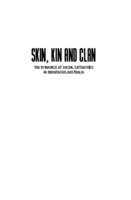Skin, Kin and Clan
The dynamics of social categories in Indigenous Australia
Contributor(s)
McConvell, Patrick (editor)
Kelly, Piers (editor)
Lacrampe, Sébastien (editor)
Language
EnglishAbstract
Australia is unique in the world for its diverse and interlocking systems of Indigenous social organisation. On no other continent do we see such an array of complex and contrasting social arrangements, coordinated through a principle of ‘universal kinship’ whereby two strangers meeting for the first time can recognise one another as kin. For some time, Australian kinship studies suffered from poor theorisation and insufficient aggregation of data. The large-scale AustKin project sought to redress these problems through the careful compilation of kinship information. Arising from the project, this book presents recent original research by a range of authors in the field on the kinship and social category systems in Australia. A number of the contributions focus on reconstructing how these systems originated and developed over time. Others are concerned with the relationship between kinship and land, the semantics of kin terms and the dynamics of kin interactions.
Keywords
social categories; austkin; indigenous australia; kinship studies; Patrilineality; Totem; WaanyiDOI
10.22459/SKC.04.2018ISBN
9781760461638OCN
1031832109Publisher
ANU PressPublisher website
https://press.anu.edu.au/Publication date and place
2018Classification
Australia
Social groups, communities and identities
Indigenous peoples
Relating to Indigenous peoples
Social and cultural anthropology


 Download
Download Web Shop
Web Shop